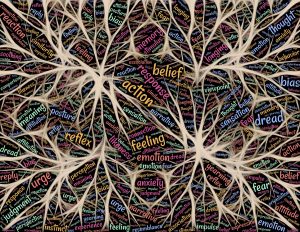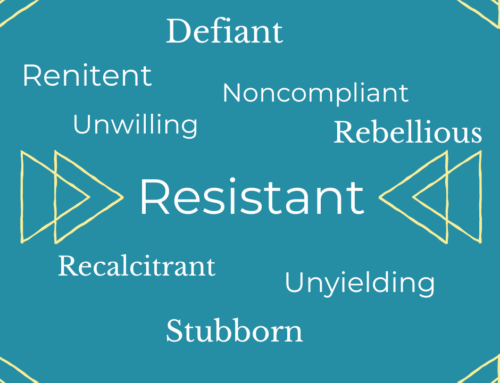Do you believe your feelings?
As hard as it may be to believe, our feelings are not facts. That is worth repeating. Our feelings are not facts. It might take a little while for that to sink in, and in fact, we may immediately reject that idea in situations where we think no one can possibly understand how we feel.
It is important to know that emotions don’t always tell us the truth. When feelings are especially strong, as they are when your teen has anorexia, it can be easy to believe things that aren’t actually based on facts. Relying solely on feelings to make decisions can lead to actions that do not get us the results we want. When you are a parent facing the extreme behaviors that anorexia is causing in your teen, the emotions you feel on a daily basis will most likely keep you from being the kind of mom or dad you want to be. That is why emotional management is such a valuable skill for parents of anorexic teens.
Emotional management is extremely important, but we aren’t required to learn about it in school. So many of us don’t know very much about how our brains operate or how our emotions are created. Because emotions are what drive us to behave the way we do, it seems like learning about them would be a priority. How fascinating that we spend so many years in school studying almost everything but our emotions! We learn calculus and physics and grammar, but there is no class to teach us about our feelings, why we have them, and how we can manage them in order to get the results that we want in our lives.
Learning to manage our feelings in ways that are useful to us is one of the most important skills we can have as humans. Yet many of us can live our entire lives at the effect of our emotions without ever knowing that we have the ability to choose the emotions we wish to have. We may think that our emotions are involuntary, but they aren’t. Most of us don’t realize that we create our feelings ourselves. When your teenage son or daughter has anorexia, the feelings that you have on a daily basis can be so intense and so painful, that it can seem impossible to believe that you have any say in how you are feeling.
Very often our feelings are on autopilot. If we feel like something is true, we usually believe that it is true. But our brains can have false alarms. Like a smoke detector that goes off when there isn’t a fire, our brains sometimes alert us to dangers that don’t exist.
It isn’t likely that without knowledge and practice that we’ll be able to pull ourselves out of our emotions long enough to learn how to manage them. But it is worth studying emotions so that we don’t become stuck in the feelings that we believe are being caused by our teen’s anorexia.
What is the purpose of emotion?
Feelings provide information.
Emotions are a signal that something is happening. For example, if we feel nervous when walking toward our car alone in a dark parking lot, we may stop and consider the facts or seek out more information than we currently have.
It’s important to pay attention to our emotions because they can give us information, but it is also important to learn to question our emotions as well. In other words, we need to keep in mind that feelings aren’t facts. So, if you are afraid, that doesn’t necessarily mean there is a true threat. Similarly, if you feel love for someone, that doesn’t automatically mean that that person is good for you. Our feelings are there to alert us to something, to show us something. But we shouldn’t stop there without first checking the facts.
Feelings have an effect on those around us.
Because feelings result in facial expressions, body posture, changes in the tone of our voice, and the way we present ourselves, our feelings communicate our emotional state to others. For example, our lack of eye contact, the raising of our voice, or an abrupt response when our anorexic teen refuses to eat may communicate anger toward our teen. Whether we are aware of it or not, our feelings influence how others respond to us.
This is so very important when we are caring for our anorexic teens because if we aren’t aware of our emotions, we will be less effective in supporting our teen’s recovery. Since emotions run high in our anorexic teens, we have to learn to respond to their strong feelings in a way that is helpful to them. If we let our responses be automatic knee-jerk reactions to their anorexic behaviors, it will be very difficult to help them overcome their resistance to eating. They are experiencing their feelings as facts, and they are unable to stop their anorexic behaviors. It makes sense that if we respond to their fear with more fear, that there is little chance of any progress.
When you are in the grips of dealing with an anorexic teen who is very ingrained in restricting food, angry outbursts, self-harming, compulsive exercise, and/or social isolation, it will not be easy to interrupt the automatic feelings you will have in response to your teen’s distress, but it is the way you can most effectively help your child.
Knowing that you have a choice of feelings may not be believable right now. If you are feeling desperate, powerless, helpless, overwhelmed, angry, sad, and/or numb, it may be impossible to imagine feeling any other way. By recognizing that our feelings have an effect on our anorexic teen, we are more likely to be motivated to manage our feelings effectively.
Feelings motivate us and prepare us to act.
Many of our responses are so connected to certain feelings that they are hard-wired into our brains. That’s why we tend to behave a certain way in certain situations. Feelings are very useful to keep us safe when we need to act without thinking. Our nervous system is very good at getting us to behave in a life-sustaining way. For example, if a speeding car is coming toward us, we will feel sufficiently motivated to jump out of the way. Strong emotions are instrumental in allowing us to overcome obstacles, so they are extremely important. For example, feeling love for your teen can help you act compassionately toward her even when her anorexic behavior escalates.
By understanding the purpose of our emotions and learning to decipher what it is they are trying to tell us, we can become equipped to use them in ways that allow us to reach our goals. Behind every action or inaction is an emotion. In other words, our actions are driven by our feelings. What we do or don’t do comes from our emotions.
If today you are struggling with results that aren’t what you want, then taking the time to really study your emotions is worth doing. To begin the study of your emotions, take the following steps:
1. Become curious about your feelings. Actively pay attention to your feelings throughout the day in order to become aware of your emotions.
2. Identify your feelings. Practice noticing the vibrations you have in your body with a certain feeling, and name the emotion. Describe the feeling without judgment. For example: If I identify anxiety as a feeling I have when my anorexic teen refuses to eat her meal, I can notice my anxiety without judging myself for feeling anxious.
3. Allow your feelings. For example, it’s okay to feel sad about what your anorexic teen is experiencing.
4. Decide if you want to feel the way that you’re feeling. Ask whether or not the feeling is useful to you. Ask how you would rather feel instead. Ask if you can feel this way and still behave in a way that is useful to yourself and your anorexic teen.
If you have started to believe that you have no choice but to feel bad because of your teen’s anorexia, I have good news. With practice you will see that you don’t have to accept your feelings as facts. The freedom to choose how you want to feel is one of the best tools available to parents of anorexic teens. Learning to manage your feelings will not only help your anorexic teen, it will also allow you to take care of yourself as her recovery continues.
A Simple Exercise
Here is an exercise I do with my clients who want to choose an emotion that is useful to them:
Imagine that all feelings are available to you at all times. You can choose any feeling you want from a platter of emotions. Visualize the platter of emotions, and choose the one that you want to have.
You may already be feeling another emotion, and that’s okay. If that emotion is not going to allow you to show up as the parent you need to be, you can keep that feeling without automatically acting upon it.
Picture yourself putting the current emotion away for now, as you choose a desired emotion from the platter. I like to picture myself putting my current emotion in a to-go box that I can carry with me. I still have the emotion with me, but I am able to choose another feeling at the same time.
Most of us don’t grow up learning very much about our feelings. Luckily, we can learn to manage our emotions at any age and under any circumstances.
If you would like to learn more about how to make your emotions work for you as you support your teen’s recovery, email me at jenni@peacemealcoach.com .






